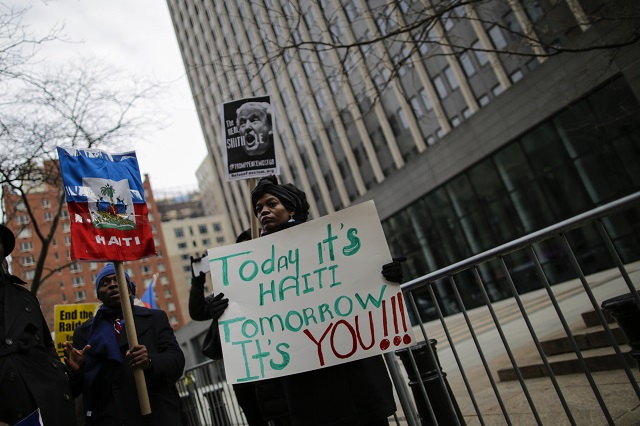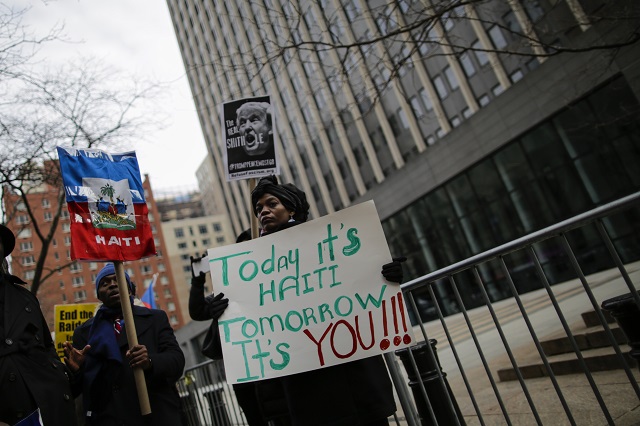
 People take part in a protest against President Donald Trump’s recent statements and words about immigration in front of the Federal Building on January 19, 2018 in New York. (Photo: Eduardo MunozAlvarez / VIEWpress / Corbis via Getty Images)
People take part in a protest against President Donald Trump’s recent statements and words about immigration in front of the Federal Building on January 19, 2018 in New York. (Photo: Eduardo MunozAlvarez / VIEWpress / Corbis via Getty Images)
Recently, the news cycle was dominated by reactions to President Trump’s use of the phrase “shithole countries” when describing El Salvador, Haiti and countries in Africa. But for anyone who has been paying attention to the administration’s immigration policies, these comments came as no surprise.
The Trump administration has made it very clear that it wants to halt or radically alter all US immigration programs. The underlying but often unspoken subtext is the goal of limiting immigration programs that serve people of color, and particularly predominantly Black nations. Calling a group of African nations “shithole countries” makes explicit the fact that racism is a driving force of the policies coming out of the White House.
Many have responded to Trump’s comments with examples of how immigrants from these countries play a vital role in the economic and social fabric of the US. But responding with instances in which immigrants of color have had to prove themselves worthy of acceptance is counterproductive. Narratives that further employ the term “shithole” to explain that immigrants from these “shithole” countries are hard workers, smart and contribute to the economy, misses the point. It doesn’t matter how hard people work or how “deserving” they are if the underlying value behind these immigration policies is xenophobia and anti-Black racism.
The Trump administration has targeted every avenue that increases racial diversity in the US. The call to end the Diversity Visa Lottery, the terminations of Temporary Protected Status (TPS), all four Muslim bans and current visa sanctions are all mechanisms the administration is using to re-whiten the immigration system.
The Trump administration has terminated TPS for Liberia, Guinea, Sierra Leone, Sudan and Haiti, all countries with majority Black populations. They have also terminated TPS for Nicaragua and El Salvador. The administration has largely dismissed conditions on the ground and the humanitarian need for this program. The recipients of TPS have been vetted by the government, and there is a large body of evidence documenting their contributions to US communities. However, this administration is not concerned with what they contribute to the United States, but would rather such contributions be made by immigrants from predominantly white nations.
Overall, the number of immigrant visas issued to African immigrants is significantly lower than those issued to recipients from other regions, such as Asia and North America. In 2016, African immigrants accounted for about 5 percent of immigrant visas, in comparison to more than 40 percent for Asians and more than 30 percent for North Americans. These disparities further reflect the underlying anti-Black racism of the immigration system.
This administration has also implemented visa sanctions on Eritrea, Guinea and Sierra Leone, preventing people from applying for temporary visitor visas, student visas and exchange programs visas. This further alienates African countries, which are already underrepresented in the general visa numbers. These sanctions have interrupted people’s ability to pursue education in the US or visit for leisure purposes, and have made it difficult for families to visit each other.
The fourth and most recent Muslim ban also targets citizens of several African countries, including Mali, South Sudan, Somalia and Sudan, all nations that are under various forms of duress. The Trump administration has also reduced refugee admissions for this fiscal year to 45,000, which is a historic low. Banning or severely restricting the human right to migrate to safety further advances this administration’s racist agenda, at an astronomical human and moral cost.
The Diversity Immigrant Visa program has been an important instrument for African people seeking to immigrate to the US. In 2014 over 43 percent of the Diversity Visas went to citizens of African Nations. In the last few months, the program has come under unexpected attack by the administration, with Trump calling to terminate it, foreclosing the opportunity for many aspiring African immigrants.
As we reflect on the arbitrary creation of borders by predominantly white nations like Britain, France, Germany, etc., we need to acknowledge the fact that the laws that govern these borders are created to disadvantage communities of color who seek to migrate. It is no surprise that those who created and benefited from the existence of borders for generations would advocate for racially biased restrictions on who can cross these borders freely.
Further embedding racism in our immigration system — through bans and quotas, through detention and deportation, and through the termination of vital, life-saving programs like TPS —is a moral and spiritual disaster for the United States. We cannot accept policies designed to separate families and communities and enforce racial and geographic segregation.
President Trump’s comment sheds light on what most Black people and other communities of color have known for a long time: This administration’s agenda to “revamp” the immigration system stems from an anti-Black, racist and xenophobic viewpoint. We need to come together to make sure that this administration does not continue to push a racist agenda in the disguise of immigration reform.
Trump is silencing political dissent. We appeal for your support.
Progressive nonprofits are the latest target caught in Trump’s crosshairs. With the aim of eliminating political opposition, Trump and his sycophants are working to curb government funding, constrain private foundations, and even cut tax-exempt status from organizations he dislikes.
We’re concerned, because Truthout is not immune to such bad-faith attacks.
We can only resist Trump’s attacks by cultivating a strong base of support. The right-wing mediasphere is funded comfortably by billionaire owners and venture capitalist philanthropists. At Truthout, we have you.
Truthout has launched a fundraiser, and we have only 48 hours left to raise $21,000. Please take a meaningful action in the fight against authoritarianism: make a one-time or monthly donation to Truthout. If you have the means, please dig deep.